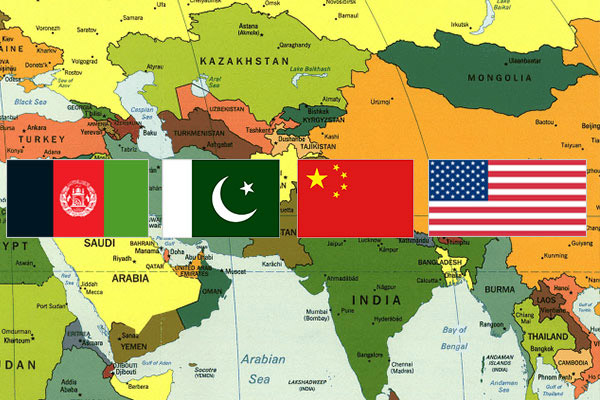INDIAN ARMED FORCES CHIEFS ON
OUR RELENTLESS AND FOCUSED PUBLISHING EFFORTS

SP Guide Publications puts forth a well compiled articulation of issues, pursuits and accomplishments of the Indian Army, over the years

I am confident that SP Guide Publications would continue to inform, inspire and influence.

My compliments to SP Guide Publications for informative and credible reportage on contemporary aerospace issues over the past six decades.
- Prime Minister witnesses 'Bharat Shakti' – a Tri-Services Firing and Manoeuvre Exercise in Pokhran, Rajasthan
- Interim Defence Budget 2024-25 — An Analysis
- Union Defence budget 2024
- Prime Minister Modi Commemorates Indian Navy Day in a Grand Ceremony
- Prime Minister Modi Flies in the LCA Tejas
- New Chapter in India-Italy Defence Ties
- Airpower beyond Boundaries
QCG and the six plus one
 |
By Lt. General P.C. Katoch (Retd) Former Director General of Information Systems, Indian Army |

The Quadrilateral Coordination Group (QCG) comprising the US, China, Afghanistan and Pakistan aimed to bring the Taliban on board to join the reconciliation process in Afghanistan was perhaps to keep Afghanistan in humour. Much before the establishment of the QCG, the US had been trying to woo the Taliban for it, but was unsuccessful. The Taliban hierarchy has always made categorical statements that they first want all foreign troops out of Afghanistan; which also implied Taliban victory if the US-NATO troops pulled out from Afghanistan. China was in contact with and assisting the Taliban much before the US invasion of Afghanistan. Pakistan has a handle on both the Pakistan and Afghan Taliban through the Haqqani network, both the Taliban having largely coalesced as acknowledged by US intelligence. As Pakistan expands its ‘strategic depth’ in Afghanistan, both China and Pakistan want US-NATO forces out of Afghanistan. A former DG ISI of Pakistan accuses the US of killing Mullah Mansour, Afghan Taliban chief through Predator strikes in Balochistan because Mansour wanted to come over ground – an absurd insinuation, perhaps to deflect the ISI links with Mansour. The fact is that the QCG was a non-starter from the very beginning because of not only the double dealing of Pakistan but the China-Pakistan nexus aiming Afghanistan to bring under their complete gravitational pull, wean it away from India and force the US-NATO out from the region. Even today, despite the massive casualties inflicted in Afghanistan (civilians, women and children included) through her proxies, Pakistan is putting all the blame on Afghanistan.
The bigger joke now is Qamar Javed Bajwa, Pakistani army chief telling General John Nicholson, top US commander in Afghanistan, that terrorist activities and inaction against militants in Afghanistan were "testing our current policy of cross-border restraint". Tickles one pink after all the institutionalized radicalization, terror generation in Pakistan and heightened proxy wars on India and Afghanistan. As per General Nicholson, of the 98 US-designated terrorist groups globally, 20 are in the Af-Pak region, which represents the highest concentration of terrorist groups anywhere in the world. Ironically, the heightened economic sanctions against Russia have forced it to get closer to China and Pakistan. To Afghanistan’s misfortune, both Russia and Iran have indicated support to the Taliban. Year 2017 has witnessed worsening of the security situation in Afghanistan. Having made Pakistan its subset with the China-Pakistan Economic Corridor (CPEC) and the strategic port of Gwadar, China (and now Russia) would like Afghanistan free of US-NATO troops. So, the Taliban is clearly getting upper hand.
After cold vibes through ignoring India, favouring Pakistan and China, and bilateral talks with Pakistan, Russia finally invited India to the six-nation talks at Moscow on February 15; Iran, Afghanistan, China, Pakistan and Russia being the other countries that were to participate in the consultations. What transpired at the meeting is not known but bringing the Taliban to the negotiating table would be herculean task. Earlier on December 27, 2016, Russia had hosted a similar trilateral meeting (Russia, China, Pakistan) but notably no representative of the Afghan government as well as India was invited then to deliberate on the future of Afghanistan. Now in late February, Afghanistan has invited India to join a new regional consultative mechanism to weigh in on the critical challenges facing the war-torn country. The new body, a 6+1 group, will include India, Pakistan, Iran, Russia, the US and China in addition to Afghanistan. The new group may not be an alternative to the "quadrilateral" because that is dominated by the US and Pakistan and buttressed by China aimed at pushing a reconciliation between Taliban and Kabul. The 6+1 group mirrors the special envoys' club, International Contact Group (ICG).
Since Afghanistan is taking the lead in the new mechanism, it is expected that it will have a greater say in the group. Among the three new members, Iran had already asked to be part of the quadrilateral, but neither Pakistan nor the US was willing. The QCG incidentally met yet again in Kabul last month but the prospects of reconciliation with Taliban remain slim. But ultimately, success of multilateral consultation groupings, whether on Syria or Afghanistan, depends on the sincerity of the members. In the instant case, the sincerity of both China and Pakistan are highly suspect, even as the Af-Pak region remains in focus of the ‘Great Game’.





